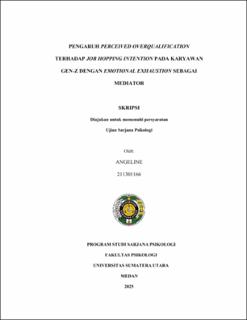Pengaruh Perceived Overqualification terhadap Job Hopping Intention pada Karyawan Gen-Z dengan Emotional Exhaustion Sebagai Mediator
The Influence of Perceived Overqualification on Job Hopping Intention in Gen-Z Employees with Emotional Exhaustion as a Mediator

Date
2025Author
Angeline, Angeline
Advisor(s)
Ginting, Eka Danta Jaya
Metadata
Show full item recordAbstract
This study aims to examine the effect of perceived overqualification on job hopping intention among Gen-Z employees by looking at the mediating role of emotional exhaustion. The research hypothesis states that emotional exhaustion can mediate the effect of perceived overqualification on job hopping intention. The research method employs a quantitative correlational approach with a sample of 420 Gen-Z employees in Indonesia who have worked for less than two years and hold a minimum educational qualification of a Diploma (D-3), selected through purposive sampling techniques. Data collection was conducted using questionnaires, including the Job Hopping Intention Scale, the Perceived Overqualification Scale, and the Emotional Exhaustion Scale, distributed via Google Forms. The research hypotheses were tested using path analysis and the Sobel test, with results showing a significant mediating effect where the two-tailed probability value = 0.0 (< 0.05), indicating that emotional exhaustion explains 67.1% of the variance in the relationship between perceived overqualification and job hopping intention (adjusted R² = 0.671). These findings highlight the importance for companies to manage employees' emotional exhaustion by ensuring balanced workloads, fostering a supportive work environment, and providing psychological support services for employees.
Collections
- Undergraduate Theses [1427]
